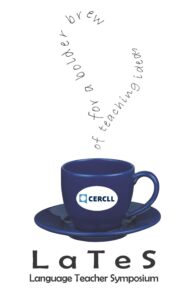Mindfulness Practices for Creating an Inclusive Classroom

Presenter: Angelika Foerst (Chandler High School)
LaTeS is a biannual in-person workshop that takes place at the University of Arizona. It is intended for K-12 language teachers to share ideas and issues that are specific to their community, and they will leave LaTeS events with methods and materials that they can implement into their own classrooms. Arizona Continuing Education credit is available.
Registration is FREE and now open, click here to register.
The deadline to apply for travel funding was October 21.
Remote Access Limitations: Virtual attendees will be able to hear and see what is happening in the room, but there may be times when the presenter will be out of the field of view of the camera and you many not be able to hear the in-person attendees. Microphones will be muted for all online participants, any communication such as questions or comments can be made in the chat. Virtual attendees may be eligible to receive a certificate of participation for this event. Terms and conditions apply.
Abstract:
This workshop will focus on Mindfulness Practices for Creating an Inclusive Classroom. The central questions to be explored are: In what ways can mindfulness practices increase language acquisition through creating an inclusive classroom environment? What is the connection between students’ interest, self-esteem, attitude, motivation, and confidence and language acquisition? Merging the ancient Mindfulness Practices of India with Stephen Krashen’s Theory of the Affective Filter, participants will examine their process for gauging student interest in their lessons/units and how exercising mindfulness practices in their daily lives can lead to increased classroom engagement. The goals for this workshop are threefold: 1) Determine what qualities are present in an inclusive classroom. 2) Identify the foundational practices, supportive practices, and instructional practices available to students that foster inclusivity. 3) Explore the connection between the physical environment, the instruction, and the state of consciousness of the instructor to language acquisition. This is a hands-on workshop (intended for the open-minded) that will provide you practical everyday tools (pranayama, asana, Kriya, mudras, and mantras) that will positively impact the way in which you interact with your students, thereby lowering your students’ affective filters, and thus, increasing language acquisition. Several of the activities involve moving around the room; however, the spacing of the room will allow for full participation by all who attend. Lastly, time for independent and/or group work will be given. Please bring your laptops, etc. With that said, there will be several activities in which you will be asked to fully unplug. Phones on silent mode/do not disturb would be greatly appreciated.
About the Presenter:
 Dr. Angelika Foerst is a graduate of Arizona State University holding a Bachelor’s in Secondary Education: French/Spanish, a Master’s in Curriculum and Instruction: Bilingual Education, and a Ph.D in Curriculum and Cultural Studies. This is her 26th year teaching French and Spanish for the Chandler Unified School District. Recently, she was selected as a participant in a Fulbright-Hays Group Project Abroad project funded by the U.S. Department of Education, through which she spent five weeks in India studying “Mindfulness Practices in a Materialistic World”. An active practitioner of yoga and meditation for over 12 years, Angelika ventured to Rishikesh to study Eastern Science and Traditions at Sattva Yoga Academy in June 2023. Through practicing what she learned abroad, she quickly observed how her interactions with her students improved creating a more inclusive classroom environment. “The more I incorporate mindfulness practices into my daily life, the more I am convinced that in the seat of the teacher my ability to hold space for my students has positively enhanced their linguistic ‘playfulness’ in my classroom.”
Dr. Angelika Foerst is a graduate of Arizona State University holding a Bachelor’s in Secondary Education: French/Spanish, a Master’s in Curriculum and Instruction: Bilingual Education, and a Ph.D in Curriculum and Cultural Studies. This is her 26th year teaching French and Spanish for the Chandler Unified School District. Recently, she was selected as a participant in a Fulbright-Hays Group Project Abroad project funded by the U.S. Department of Education, through which she spent five weeks in India studying “Mindfulness Practices in a Materialistic World”. An active practitioner of yoga and meditation for over 12 years, Angelika ventured to Rishikesh to study Eastern Science and Traditions at Sattva Yoga Academy in June 2023. Through practicing what she learned abroad, she quickly observed how her interactions with her students improved creating a more inclusive classroom environment. “The more I incorporate mindfulness practices into my daily life, the more I am convinced that in the seat of the teacher my ability to hold space for my students has positively enhanced their linguistic ‘playfulness’ in my classroom.”
Thank you to the College of Social and Behavioral Sciences, Center for Middle Eastern Studies, Center for Latin American Studies, and Arizona International for their contributions to make this event possible!

